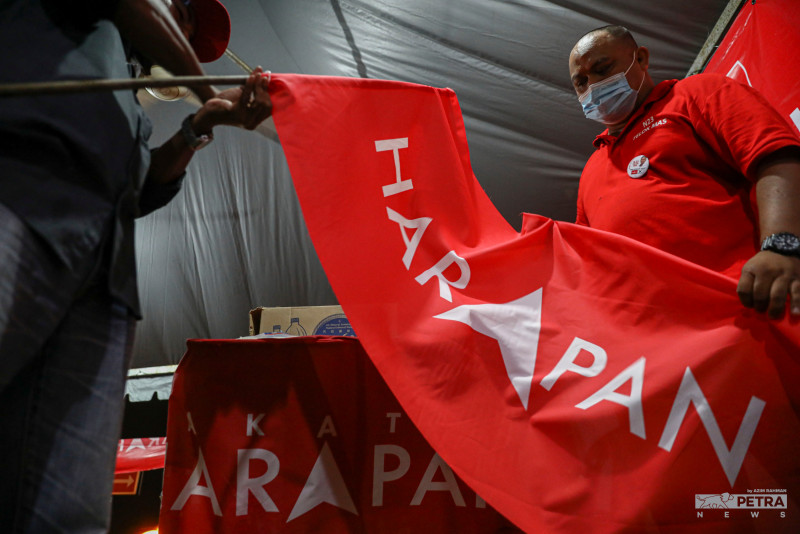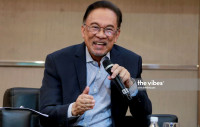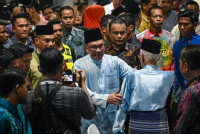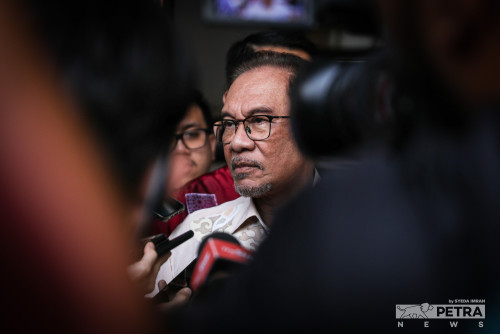WHEN Datuk Seri Anwar Ibrahim was unexpectedly appointed as prime minister after the 15th general elections, it silenced many opportunists, including the renegades within Pakatan Harapan (PH) itself, who had previously ridiculed him for never being able to reach the top government office.
Nonetheless, Anwar’s first cabinet lineup shows that unity is his top priority, and he has to line up according to each “party’s will”.
But, as a positive development, the “court cluster” within PH itself has not joined the cabinet, setting a formidable example for others within and outside the unity government to follow.
PH should have learned a dear lesson from the Sheraton Move and avoided repeating the same mistakes. Apart from Tun Dr Mahathir Mohamad, Tan Sri Muhyiddin Yassin and Datuk Seri Azmin Ali’s breaking of their allegiance to the cause of reforms, the coalition was extremely amateurish in selecting and appointing their executives at all levels now and then.
The component parties did not appoint administrative officials according to merits, party seniority, or political and administrative experiences.
Quite on the contrary, factionalism overshone the due process of selecting candidates for elected lawmakers to all levels of executive and administrative office bearers.
The political patronage used in appointing administrators of all levels was undeniably the main reason for the collapse of the PH government in 2020.
These major shortcomings, from selecting candidates for state and parliamentary seats in the general elections to appointing ministers and state executive members after becoming the government, have become the main challenges for the existing unity government to resolve and to succeed in its bid for true institutional reforms.
If candidates for both lawmakers and executives are not appointed based on seniority, organisational and administrative skills and political experience but instead based on factionalism and political patronage, these executives and lawmakers – who have no or little legislative and administrative experience – have failed to interact effectively with constituents and people they serve, and this has made it difficult for the new government to administer the country efficiently.
The unity government needs the full cooperation of the bureaucratic system to succeed in the much-desired socioeconomic reformation. It is noted that the former PH top-level executives had largely failed to convince the civil servants to follow suit of their own poor performance and directionlessness, which was a determinant factor by which the PH government could not have sustained its first round.
If PH continues to allow newcomers in the political arena, who have no administrative and political experiences, to dominate its narratives and direction of the new government’s policies, this will make the unity government led by PH once again embark on the fate of a short-lived government.
On the contrary, the coalition must integrate the experience, wisdom, professionalism and courage of all three echelons-that is young, middle and senior leaders to govern the country, and welcome more brainstorming to accommodate a wide variety of talents and insights.
With the cooperation of other component parties in the unity government, they must formulate comprehensive and long-term policies to benefit the people, and then PH will be most likely to sustain for a long period.
Only after then, It could be predicted safely that PH and its partners would be able to re-engineer Malaysia into a first-world economy at the earliest.
The unity government cannot rely too much on the philosophy of elitism to govern the country but instead must rely on effective communication between the grassroots organisations and professionals who are good at gauging the pulse of the nation to implement the intended socio-economic reforms effectively and convincingly.
It will pave the way for a more solid foundation for Anwar to remain prime minister for at least two terms because realistically speaking, Anwar needs at least two terms in office before he could actually carry out any meaningful systemic and institutional reforms to propel Malaysia to a first-world economy.
For the past 60 years, one-race one-religion one-nation supremacist narratives have monopolised the official political narratives.
PKR is the only Malay-dominated pluralistic party in the country, which appropriately reflects the social reality of our country: a pluralistic society with a Malay-Muslim majority.
It has sustained the Malaysian political turbulence, and survived and thrived for more than 20 years. It was an extremely appalling political move for any comrades within PH to undermine PKR and discredit Anwar Ibrahim.
In fact, some have worked with the Malay supremacist forces in undermining PKR as they do not want to see a Malay-majority multicultural party impacting their hegemony on Malaysian politics.
Nonetheless, there are pseudo-reformists and detractors within PH itself buying into the Malay supremacist narrative, who are trying to replace PH’s reform narratives with a regressive one. But in reality, they have effectively damaged the coalition’s leading reform narrative while making ways for others’ narrow ethnonationalism.
In the past two years, even though PH lost the state elections in Melaka, Sarawak, and Johor, some top leaders had excluded leaders who provided dissenting views that have been politically accurate and would have prevented.
These detractors within PH had tried to discredit long-term comrades-in-arms and PH leaders, advocating pessimistic and ultra-conservative views and instilling a sense of “inescapable realpolitik of single-racial hegemony”.
I had strongly and openly given the view that other PH component parties and leaders should have united and supported PKR instead of belittling PKR before the 15th general election.
After the Sheraton Move, instead of reuniting PH rank-and-file, some self-proclaimed strategists and pseudo-reformists went around and instigated their grassroots by claiming that Anwar’s era was over, deliberately undermining whom they shared similar ideas and inspirations for reforms.
These self-proclaimed political experts and strategists could not even understand the actual power structure in Malaysian politics and the inspiration of ordinary Malaysians and wanted to replace Anwar as the prime minister of PH with a non-PH leader.
But after Anwar became prime minister, these opportunists immediately turned around and praised Anwar hoping for something they themselves know best.
Nonetheless, Anwar needs to be empathetic to his loyal supporters, but he also has to meticulously coordinate the cooperation between all component parties from different alliances within the unity government.
In times to come, he may have to boldly introduce more politically experienced professionals into his lineup to reform the system stepwise, lest he accidentally steps on any political landmine before any substantial reforms could be realised.
Before the 14th general election, some leaders within PH had misled the public and falsely declared that “Mahathir has changed”. Many even believed that “without Mahathir and Bersatu leading PH, PH can never win Putrajaya.
This short-sighted and baseless argument also proves that some within PH had no will to reform the political system themselves.
There are still news reports to this day to prove that I have consistently tried to convince PH leaders that Bersatu and Mahathir should not be allowed to dominate the operation of PH at that material time, and any cooperation should have remained on the aspect of institutional reforms.
Why did some PH leaders take the risk to willingly disarm themselves and let Bersatu and Mahatir dominate the coalition?
Does such a risk-taking approach really take the long-term interests of the people and the so-called “big picture” into consideration? Or did it involve personal political interests?
Such remarks not only wiped out the credibility of the reform movement that Anwar, PKR, DAP and many others had sowed since the 1998 Reformasi Movement, and they also failed to defend the original aim of Reformasi, that is to do away with the elitist economic system instilled by the Mahatirist regime.
They literally put the cart before the horses and detracted from the course of reforms. Therefore, the early demise of the former PH government should not have come as a surprise after just 22 months in power.
As far as the accountability of political leadership in any progressive democracy is concerned, such political leaders should have long since resigned and retired from politics for good for their inconsistent political stands.
On the surface, Mahatirism champions the political supremacy of the Malays and “indigenous peoples’’, but in reality, it only maintains an economic system monopolised by a small number of oligarchs.
Those who profess it have very little interest in the well-being of the nation but to enrich themselves at the expense of the poor. It was foolish for PH to allow the Mahatirists to dominate the PH government previously.
It not only failed to carry out reforms in a consistent manner but also allowed Bersatu and Mahathir to continue to defend and exploit political mileage from the ailing old system, which in turn destroyed the credibility of PH component parties.
Obviously, some top PH leaders were influenced by the so-called “strategists” whose credibility and capability were vastly overrated. The biggest failure in PH’s “strategy” was letting Bersaru and Muhhyiddin dominate the Johor PH government then.
The author once publicly warned that it was an extremely precarious arrangement for PH. The key to the failure of Johor PH lies in the leaders’ inferior complex believing that they could not have won in Johor without Bersatu, discrediting their own efforts to have progressive governance altogether.
Johor PH did not grasp its own advantages in the process of negotiation. Instead, they were convinced to give up 18 winnable strategic Johor state seats and some parliamentary seats to Bersatu, which planted the seeds for the Johor PH government’s early downfall, and the subsequent collapse of the PH Putrajaya government.
But frankly speaking, most leaders within PH never foresaw the possibility of becoming a government or attempted to form a sustainable government at that material time.
One should perceive the real situation from a more positive angle that Bersatu actually won the 14th general elections by relying very much on the strength of the various parties within PH, and thanks to the achievements of the reform movement over the past 20 years sparked by Anwar Ibrahim himself.
Some within PH itself, especially those who joined politics more recently, had been systematically conditioned to believe that the coalition could never set foot on Putrajaya without Bersatu, Mahatir and Muhiyddin.
It was an overstatement in justifying one’s self-interests at the expense of the Reformasi movement itself. Such a self-destructive strategy gave Bersatu practically the opportunity to be an effective Trojan Horse and to destabilise the PH’s own bases, especially in Johor.
They were the pseudo-reformists who took the opportunity to rip away a substantial number of the voters who had originally supported the reform agenda. PH leaders at all levels must admit to their own past mistakes in key decisions, and continue to act as effective implementers of reforms in the unity government, so as to avoid repeating the same mistakes that have failed the people’s expectations.
The unity government and PH are actually facing multiple assaults not only from the far-right who play on the race and religion cards. In reality, the pseudo-reformists and renegades within its own fold have undermined the unity government in the benefit of the far-right who prefer a divide-and-rule policy.
They have collectively and deliberately turned a blind eye to the inefficiency of the single-race dominance socioeconomic policy and condemned corruption only selectively.
They even openly agreed with Mahathir’s previous racial stereotyping that “as long as I have money, I would rather be a non-bumiputra”.
PH has to re-strategise and regain its own lost grounds in the long term. The most important strategy for PH to recover lost grounds and its reform narrative is that leaders must listen to public opinion more closely.
The elected representatives must maintain close relationships with civil society and take public feedback seriously in their process of policy making, while the unity government must be more agile in formulating effective policies to ensure public confidence with foreseeable long-term reforms and prosperity.
More importantly, there is a need to boost the national economy and human development with greater societal input and feedback.
On the other hand, in order for the nation to respond to the government’s call for reforms, the government must pass on the information on any policy changes through effective cabinet ministers and approachable parliamentarians whereas the freedom of information among the people should be advocated so as to make the people understand and give feedback on any government’s new policies. – The Vibes, June 21, 2023
Dr Boo Cheng Hau is the former Johor DAP chairman

















.jpg)

